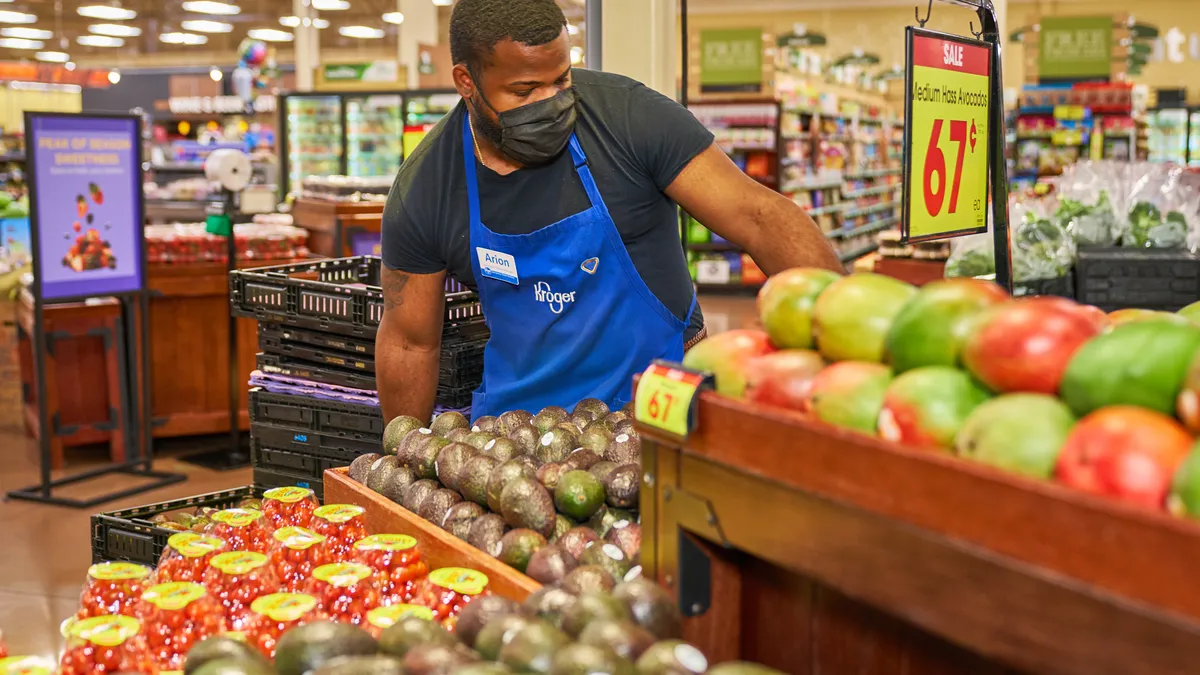Dive Brief:
- Kroger announced Friday it set a new supplier goal that requires all of its fresh produce suppliers to use Integrated Pest Management practices for all products supplied to the grocery company by 2028 or 2030, based on the grower's size.
- The grocer expects medium- to large-sized growers to meet the goal by the end of 2028 and gives small-sized ones until 2030.
- Kroger said that the change will protect more pollinators and help create a more sustainable produce supply chain.
Dive Insight:
The new target builds on Kroger’s work to find opportunities to advance sustainable agriculture practices in its supply chain.
Kroger is now requiring suppliers to comply by achieving one certification out of a list of more than a dozen options such as Bee Better, Certified Sustainably Grown and Rainforest Alliance.
Integrated Pest Management is an “environmentally sensitive approach” to pest management that uses information on the life cycles of pests and their interaction with the environment to manage pest damage with the “least possible hazard” to people, property and the environment, according to the Environmental Protection Agency.
"We depend on a healthy and resilient agriculture supply chain to keep bringing fresh, affordable food to more of America," Lisa Zwack, head of sustainability for Kroger, said in a statement. "This new goal reflects Kroger's evolving approach to sustainability and resource conservation, including setting clear expectations with growers to support the transition to more sustainable fresh food production."
Kroger said that the new goal helps to protect biodiversity and adds to the company’s existing work to conserve natural resources in its supply chain, such as through seafood sustainability and no-deforestation commitments.
Kroger said it worked with the Sustainable Food Group, which is a branch of IPM Institute of North America, to develop the goal and create a compliance roadmap. The retailer also surveyed suppliers “to ensure the goal was both impactful and achievable.”
Having fresh produce suppliers adopt Integrated Pest Management and other sustainable agriculture practices will support pollinators and the broader agroecosystem, Ariel Larson, senior project manager at Sustainable Food Group, said in the announcement.
“Many of our suppliers are adopting a variety of integrated pest management (IPM) practices, supporting biodiversity by maintaining pollinator habitats and adopting water conservation measures,” Kroger said in its 2023 ESG report, which was released in September.
In the Friday announcement, Kroger said it will keep working on growing its sustainable agriculture, biodiversity and conservation efforts. The grocery company said it plans to do a supply chain biodiversity risk assessment, pilot biodiversity metrics with row crop and specialty crop suppliers, and conduct targeted climate risk assessments within its supply chain.
Other food retailers are also stepping up their efforts to better protect pollinators. In December, Whole Foods Market announced a new pollinator policy for its fresh produce and floral purchasing that includes implementing an Integrated Pest Management system and eliminating the use of certain pesticides and chemicals by 2025.
Walmart has a similar goal. The retailer unveiled in 2021 a policy for fresh produce suppliers that includes having all of its fresh produce and flowers 100% sourced from suppliers following integrated pest management practices by 2025.














